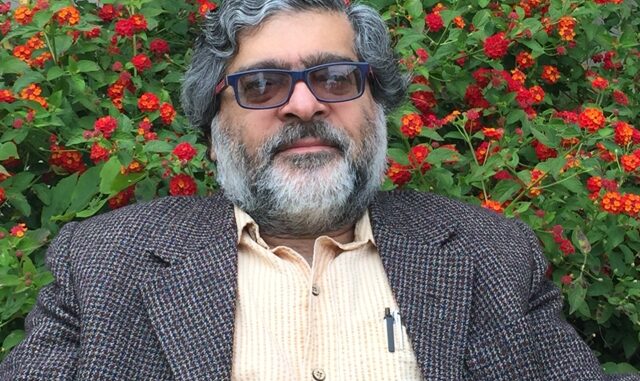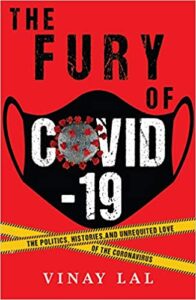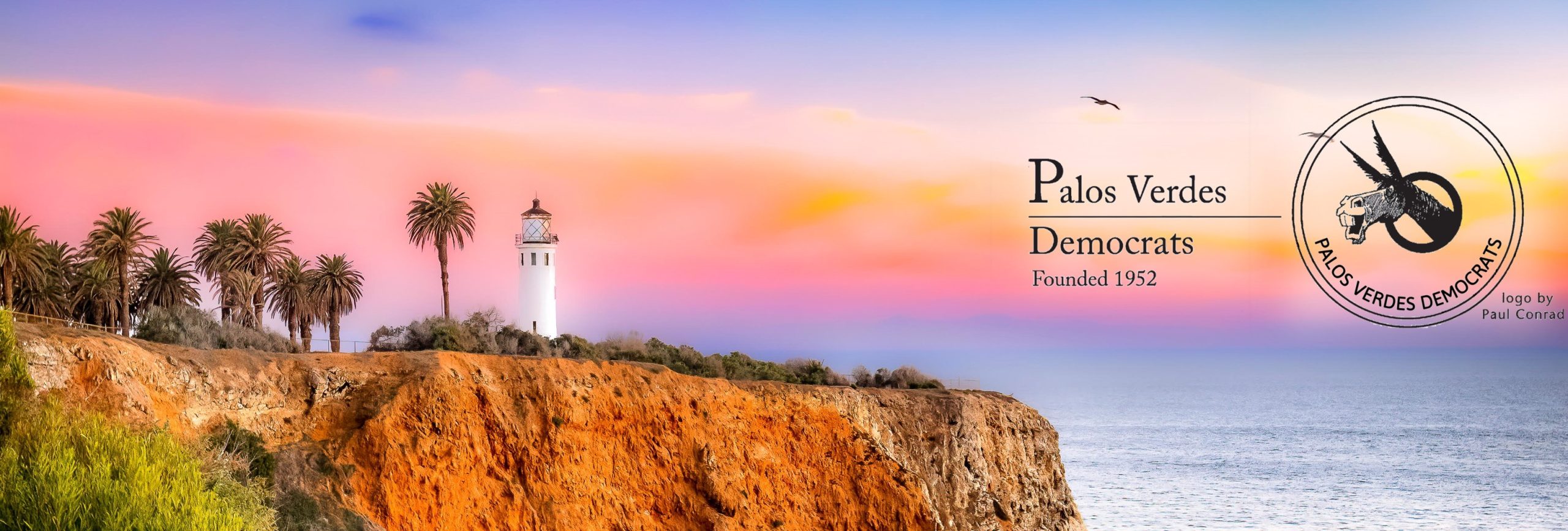
By Fraser Perkins —
The Palos Verdes Democrats’ May 2021 meeting featured Dr. Vinay Lal, Professor of History and Asian American Studies at UCLA, speaking about The Impact of the January 6 Events and the Global Turn to Authoritarianism: The Perils, Promise and Prospects for Democracy. Born in Delhi and raised in India, Indonesia, Japan and the United States, Professor Lal joined the history faculty at UCLA in 2003. 
Professor Lal’s most recent book is The Fury of Covid-19: The Politics, Histories, and Unrequited Love of the Coronavirus. This book investigates the social, cultural, political, and philosophical aspects and implications of the pandemic, and evaluates the fate of humankind and the earth in its wake.
An underlying theme of Professor Lal’s presentation was that since the end of the Cold War and the break-up of the Soviet Union, the global order has been marked by the rise of authoritarianism, not just in the United States, but also in the world at large.
To help the reader delve more deeply into the details of Professor Lal’s presentation, we’ve annotated the time (e.g. 1:30 is 1 minute 30 seconds) that the discussion occurs in the video. The video is provided at the end of this article.
2:00 Professor Lal divided his talk into five aspects of authoritarianism:
- An exploration of the meaning of the end of the Cold War
- Review of governance in Myanmar (formerly Burma)
- Events of January 6
- Evaluation of Indian politics
- Future prospects for democracy
4:14 End of the Cold War
A prevailing view following the end of the Cold War was that the end of history had been reached, and most countries had either achieved liberal democracy or were close to it. The rise of Muslim rage and the endless American wars in Iraq and Afghanistan have undermined this opinion. In Professor Lal’s view, what we are really seeing is a very ominous worldwide turn of events similar to the period between WWI and WWII.
5:04 Myanmar
Before independence, Burma was ruled by Britain from India. Following independence, Burma had a civilian government headed by the father of Aung San Suu Kyi until a coup in 1962, which ushered in 50 years of military rule. During this military era, a slow transition to civilian rule occurred, accelerating in 2016 with the onset of a hybrid civilian-military government allocating 25% of Parliamentary seats to the military. The election of 2020 established the ascendancy of Aung San Suu Kyi’s party, as it won a majority of Parliament. In February, one day before seating the new Parliament, the military effected a coup d’etat. Since then, the police-military government has maintained control by using several intimidation techniques such as erecting an internet wall (akin to China), releasing 23,000 nonpolitical prisoners, and the deliberate setting of fires. The prisoner release freed up jail space for political prisoners and all the measures were designed to sow chaos. The United States denounced the coup and imposed financial sanctions; a toothless response, in Professor Lal’s opinion, which had no impact on Myanmar’s military rule. In contrast, both Russia and China retained major influence in Myanmar. Russia provides military training and China provides development and communication resources.
The ethnic makeup of Myanmar adds another layer of complexity. The Bamar people, though not a majority of the total population, make up the largest ethnic group in Myanmar and the military is almost exclusively Bamar. Resistance to the military coup is therefore both civilian and ethnic. Professor Lal also observed, “In many developing countries the richest resources are located in areas occupied by ethnic minorities.” Controlling precious resources in areas controlled by ethnic minorities is a third factor contributing to the widespread Myanmar unrest. Professor Lal ended his commentary of Myanmar by noting “There are never any true unadulterated heroes in any movement or resistance. It’s always a complicated story.” Many of the civilian groups pitted against the military coup ignored the ethnic cleansing of 750,000 Rohingyas, a Muslim minority, within their own country.
30:29 Events of January 6
Professor Lal prefaced his remarks by noting that for minorities, the two political parties offer only minor differences and in his evaluation both political parties represent a colossal non distinction. Professor Lal maintained, “It is impossible to understand your own civilization, unless you know another civilization which is vastly different, equally well.” In his view two themes emerged from January 6: the calling into question of American exceptionalism and the unacknowledged history of genocide. He did not see the violence of the Jan 6 events as an anomaly, but rather as an example of deep seated violence within our country. He buttressed his thesis by noting that both political parties have failed miserably in controlling gun violence. He emphasized that gun violence is a manifestation of suspicion of the state. While a certain suspicion of the state is healthy, nations such as the UK have controlled gun violence while still maintaining a healthy suspicion of what their government is doing. He continued by noting that Japan, a country with 1/3 the US population averaged 11 gun deaths per year over the past decade. This stands in stark contrast to the U.S. [Editor’s Note: In the U.S. in 2019 there were 39,707 gun deaths including 14,861 homicides. Most gun fatalities are suicides, with accidental gun deaths accounting for only a small proportion of gun-related fatalities.]
Professor Lal traced the idea of American exceptionalism back to the Pilgrims and Puritans. He noted that every American president including Barack Obama has perpetuated the idea of American exceptionalism. He cited the American view of sports as an example. American sports rarely end in a draw; we want a winner and a loser. The metaphor of exceptionalism permeates our culture – one example is our refusal to recognize genocide is part of our history. Professor Lal believes recognition of our own history is a prerequisite for our country becoming a force for good in the world.
45:23 Indian Politics
Referring to India and the U.S., Professor Lal reflected, “I consider it my particular misfortune that the two countries I’m most closely associated with, present the worst spectacle of a democracy.” He began his elucidation with a brief history of India’s current Prime Minister, Narendra Modi, and his Bharatiya Janata Party. Modi was banned from the U.S. because of a 2002 Muslim pogrom he supported, while governor, in Gujarat State. Despite repeated attempts by Modi to visit the U.S., his visa application was turned down by the U.S. State Department in recognition of these past actions. However, in 2014, after Modi was elected India’s Prime Minister, President Obama made the decision to meet with him, marking the first bilateral summit between the two leaders. This summit, according to Professor Lal, was instrumental in rehabilitating Modi’s international reputation.
During India’s early years following independence from Britain, it set a world example for democracy. Its civilian governance stood in stark contrast to military rule in Pakistan. Professor Lal cited several reasons for the degradation of Indian democracy: the gutting of institutions such as its Election Commission; the destruction of Indian universities; the abdication of its independent court system; and, the use of colonial era legislation to suppress opposition. He concluded by noting that India also gave up on the idea of public health and this privatization of health care contributed to India’s COVID-19 crisis. He contrasted the U.S. and Indian COVID-19 responses to Cuba’s response. Despite U.S. sanctions and fewer resources, Cuba’s investment in public health enabled it to handle the pandemic relatively well.
1:03:32 Prospects for Democracy
In this last section of his presentation, Professor Lal elaborated on seven points:
- We should recognize the limits of electoral democracy, especially the risks posed by money, corruption and the challenge of one person representing a huge number of people.
- The disappearance of ethics from politics – shame is no longer part of our working politics. While this isn’t unique to the United States, we have many examples of shameless politicians such as Donald Trump and Anthony Weiner.
- Our politics is often reduced to identity politics.
- Americans view their history as an example of exceptionalism on one hand, while denying our history of genocide on the other.
- Reduction of both India and the U.S. to one-party states. The Congress Party, historically a major Indian national party, has largely disappeared from the national scene and has been relegated to the governance of individual Indian states. Professor Lal considers the present Republican Party in the U.S. as a “cabal of monsters and criminals immersed in white supremacy,” and said, “I think it should be declared a terrorist organization.”
- Democracies need to learn from other parts of the world, particularly when it comes to dealing with historical terrorism in its recent past. He cited the examples of the South African Truth and Reconciliation Commission and the amnesty granted to Hutus following the Tutsi genocide in Rwanda.
- The protests in the streets offer some hope of democratic rejuvenation.
1:20:20 Questions and Answers
Did India have the same disdain for masking that certain segments of our population have?
With some exceptions, masking was initially widely observed. Masking has not been a major issue for India.
Does celebrity worship contribute to authoritarianism?
“Yes.” He added that celebrity culture is much greater in the U.S. than elsewhere.
Is there a common thread of other countries going to authoritarianism?
There is a tradition of the “strong man” in many other countries.
Did Professor Lal have any comments about Subhas Chandra Bose? [Editor’s Note: Bose was an Indian nationalist who attempted to rid India of British control during WWII with German and Japanese help.] Professor Lal summarized Bose by saying that in Bengal, Bose has always been considered a hero, but that a better question is, “Has the present government exploited his name for advantage? Yes.”
Are the difficulties of democracy related to the imposition of democracy on people without their consent? “Yes,” and cited the example of the European construct of a nation state. When applied to Africa, a nation state often has little relevance to nomadic people or pastoralists, who have neither knowledge nor need for a nation state. [Editor’s Note: The Berlin Conference of 1884 carved up Africa into spheres of European interests. It was designed to minimize conflicts between European powers and completely ignored the interests of the people subject to European colonialism; not unlike the “Louisiana Purchase” between France and the U.S. which ignored the interests of Native Americans.]
What are the factors allowing right wing populists to beat back its opposition? Professor Lal cited three factors. 1 – The far right uses the internet far more effectively than the left does. 2 – The rural-urban divide generates support for right-wing populists. 3 – Immigrants and internal migration create a perceived threat which translates into support for right-wing authoritarians.
Professor Lal concluded by saying, “Our task as citizens is to try to unsettle the state.”

Leave a Reply